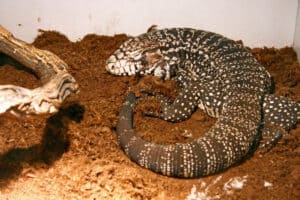
Argentine black and white tegus are known in the lizard community as great pets for a number of reasons. Typically Argentine tegus have longer lifespans than most other pet lizards. But just how long do tegus live in captivity?
The average Argentine tegu lifespan in captivity is about 15-20 years when properly cared for. Tegus can also live for up to 20 years in the wild, even when introduced to non-native environments.
The ability of tegus to survive and thrive is one of the reasons they are even becoming an evasive species in some areas. As tegu owners, proper care is the best thing you can do to encourage a long lifespan for your Argentine tegu.
How Long Do Argentine Tegus Live In Captivity
The lifespan of the Argentine black and white tegu can be dependent on a number of factors. The environment and other things such as diet can affect how long your tegu will live in captivity.
15-20 years is a typical lifespan of an Argentine tegu in captivity. I have also heard of tegus living years longer than this. However, without proper care tegus can suffer premature death and health problems.
Though there is no guarantee that your tegu will live a long life if you follow the information given in this post, you should do everything in your power to help your tegu live a healthy life.
Below, we’ll discuss factors that play into how long tegus live, and how to keep yours healthy and happy for a long time to come.
Factors That Can Affect The Lifespan Of Your Argentine Tegu
Though some health factors might be out of your control, there are many things you can do to help ensure the health of your Argentine tegu.
Some of this starts before you even bring your tegu home as a pet. This brings me to my first factor.
Purchase A Healthy Tegu From The Start
The first step to choosing an Argentine tegu with a long lifespan starts before purchasing. You want to make sure that you are getting your tegu from a good breeder.
This does not mean that you cannot purchase a tegu from a pet shop, but they should know where it was bred and be able to talk to you about it.
Next, you are going to want to examine the Argentine tegu for noticeable signs of good or bad health. A healthy tegu should be flicking its tongue and showing signs of alertness and activity.
Check the eyes of the lizard to make sure they are clear with no signs of runoff.
You might also check the vent ( private area ) of the tegu to make sure there is no build-up or signs of bad health conditions. Watch the tegu in its enclosure to make sure it is active and seems to be healthy.
You can even ask the store clerk if you can watch the tegu eat. Unless they just got done eating, the tegu should be jumping at the opportunity to get some grub. Especially if it is still a juvenile.
Getting The Right Enclosure
Providing your Argentine tegu with the proper housing is vital for his well-being. When setting up your tegu’s habitat, make sure to keep the following in mind.
Argentine tegu enclosures need to be at least 1 ½ times the size of the lizard. It’s best to go as large as you’re able to, but aim for no smaller than 8’x4’x4’.
Tegus aren’t climbers, so focus more on giving the lizard ample floor space, and less on height. Most adult tegus will require a custom-made enclosure, so be prepared for that when you set out to purchase a tegu.
If you try to house a tegu in an enclosure that is too small it can cause stress and prevent your tegu from getting enough exercise. So making sure that your tegu has enough room to move around is crucial to the lifespan of your tegu.
Provide Enough Substrate For Digging
Tegus like to dig, so provide about 8 inches of substrate at the bottom of the enclosure. This will give him enough room to dig and burrow.
Because they need high humidity levels in their environments, tegus do best with substrates like cypress mulch and soil, which retain a lot of moisture.
Don’t keep the substrate too wet, though, or your tegu may develop a dangerous condition called scale rot (discussed below).
Tegus Need The Proper Humidity Levels For Optimal Health
Humidity is important for tegu health, so aim to keep the enclosure between 70-85%. You can do this by providing a large shallow water dish, misting the enclosure, and providing a humidity hide box.
Proper Temperature Is Important For A Long Tegu Lifespan
Argentine black and white tegus like the heat. They need a basking spot that can reach temperatures from about 115-130 degrees Fahrenheit. That said, they also need a spot where they can stay a bit cooler.
Provide a cooler side of the enclosure that stays around 75-85 degrees and a warmer side that stays around 90-95 degrees. The basking spot would be on the warmer side of the enclosure.
It might be easier to reach these temperatures by providing something your tegu can climb up on to get closer to the basking light.
Because reptiles can’t regulate their body temperature on their own, it’s important to give your tegu a spot to warm up as well as places to cool down, rather than keeping the entire enclosure the same temperature.
For a complete guide check out my article on ideal tegu temperatures.
UVB Light Helps Provide Vitamins And Minerals
UVB light helps with calcium and vitamin D3 absorption, so supply your tegu with UVB rays from a UVB light bulb designed for reptile habitats. This is essential if you are looking to ensure your tegu lives a long healthy life.
A Healthy Diet Is Key To Tegus Living Long Lives In Captivity
As important as any animal’s habitat is its diet. Argentine tegus thrive when their meals contain a variety of veggies, meat, and insects.
Tegus are usually fed every other day, and the staple of their diet in captivity is usually crickets and roaches dusted in a calcium and vitamin supplement. Some suggestions for switching it up are:
- Mealworms and waxworms
- Mice and chicks
- Lots of veggies and occasional fruit
- Canned dog food ( Must be the right kind )
- Eggs
Although Argentine tegus do eat meat, don’t overdo it on the protein, or it can lead to kidney failure. For more on what tegus eat, check out my article: Argentine Tegu Diet!
It’s also important to provide your tegu with a large shallow dish of clean, fresh water for drinking and soaking. You should use filtered drinking water for your tegu.
Do not use distilled water or tap water. Change it out every day, and any time it gets contaminated.
Be careful when feeding your tegu, as their bite is quick and powerful – you don’t want them missing the food and getting your hand.
Tegu Lifespan Can be Extended With Proper Exercise
Argentine black and white tegus, in addition to being huge, are also very intelligent. Leaving your tegu in his enclosure all the time will lead to boredom and obesity. Like humans, reptiles can also suffer health problems from being overweight.
Exercise your tegu a few times a week outside the cage, to provide important physical and mental enrichment. After all, exercise and obesity can affect the lifespan of an Argentine black and white tegu.
Happy Tegus Live Longer In Captivity
Argentine tegus are known for being the most personable types of tegus. They’re also highly intelligent, and are even capable of being potty trained!
It is important to know that even though most tegus are friendly and docile, there is no guarantee that they will always be.
The more a tegu is handled when it’s young, the more docile and friendly it will become as an adult.
Be sure to be consistent, patient, and gentle with your tegu, especially as he’s getting used to you. Over time, tegus can become quite attached to their owners, and are known to show affection for humans.
They do have a nasty bite though, so don’t bother a tegu who’s telling you to leave him alone. Signs of irritation include heavy breathing, tail swishing, and foot-stomping.
If your tegu displays any of these signs, back off and give him some space and time to settle down. One common mistake some new tegu owners make is hand-feeding their tegu in their enclosures.
This can lead him to associate your hand with food, resulting in accidental bites. For more on tegu temperament check out my article: Are tegus friendly?
Argentine Tegu Lifespan: Common Health Issues To Watch Out For
Sometimes pets get sick, even if you take good care of them. These are some of the afflictions common to Argentine black and white tegus.
Health problems and diseases are one of the biggest factors that affect the lifespan of the Argentine tegu. If you are dealing with any noticeable health problems reach out to your veterinarian for help.
Mineral Deficiencies
Calcium and phosphorus are the most common mineral deficiencies seen in tegus and most captive reptiles. This can be easily prevented by using a high-quality calcium supplement. The ratio of calcium to phosphorus should be a 2:1 ratio.
Metabolic Bone Disease
Metabolic bone disease is a painful disorder, which some refer to as “tegu rickets.”
MBD is preventable and is caused largely by D3 deficiency and lack of UV light. High temperatures and kidney failure can also bring on MBD.
Obesity Can Shorten Tegu Lifespan
If your tegu’s belly is dragging on the ground, he might be obese. Tegus are highly susceptible to obesity, since they’ll eat pretty much anything and are often under-exercised.
Obesity can affect the organs and overall health, so make sure to keep your tegu’s weight in the healthy range. Have him checked out by a doctor at least once a year to make sure his weight and overall health are good.
Be Watchful of Intestinal Blockages
Some tegus are prone to intestinal blockage, especially if they eat whole mice with fur, or too much protein.
Tegus Can Get Parasites
Argentine tegus can develop intestinal parasites. Signs of parasites include lethargy and weight loss.
Respiratory Infections
If your tegu is drooling, has swelling around the mouth and nose, or is having difficulty breathing, he may have a respiratory infection.
These are usually treated with antibiotics. But the person you should be asking about this is your veterinarian.
Dehydration Is Deadly For Tegus
Make sure your Argentine tegu has a constant supply of clean fresh water. Dehydration can kill tegus and can happen if you don’t offer enough water, if the water’s too dirty to drink, and if the enclosure’s temperature is too high.
Scale Rot
Scale rot is a potentially deadly disease that is caused by a bacterial infection, often when a wound isn’t kept clean, or when bedding is kept too wet.
Browning scales are the first sign of scale rot, along with flaking skin. Quick discovery and vet intervention is key to making sure your tegu heals.
Keep an Eye Out For Prolapse
Tegus from Around the World has a detailed article about prolapse in tegus. This problem is often caused by dehydration, constipation, and intestinal parasites.
Final Thoughts
Adopting an Argentine tegu is definitely a commitment, requiring a lot of space in your home, as well as the cost of building and maintaining such a large enclosure.
All of these factors will affect the lifespan and health of your Argentine tegu. But if you provide your tegu with the right environment, he will provide you with entertainment and affection for decades.
This makes it well worth the effort. For more on tegu care, check out my Complete Argentine Tegu Care Guide!
